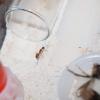I don't have any experience with Atta, but I am keeping some Trachymyrmex septentrionalis. Food-wise, I'd imagine they're similar with the exception of Atta being scaled way up and also less picky. You can offer leafcutters plants that you find outside, as long as you're sure they are growing in an area that doesn't use pesticides or fungicides. I feed my Trachys some plants from my garden, since I know for a fact that I don't use any sorts of chemicals on my plants. During the winter months when there aren't any outdoor plants to feed, they do fine on dried plants. You can get packs of dried flower petals online. Rose petals are a favorite of my Trachy, but they enjoy a variety of other types as well. Oats, especially steel cut oats, are available at grocery stores and are another favorite of my Trachy, I don't see why Atta wouldn't like them as well. In this paper, myrmecologists use Cream of Rice cereal to feed lab colonies (as well as insect frass, orange peel and apple). Mine have accepted Rice Krispies cereal, as well as assorted types of fruit (except for citrus, which they seem to despise, but I've seen Atta enjoying citrus). Just be sure that if you use fruit, it is free of pesticides or fungicides.
You shouldn't have to worry too much about your ants getting a disease from plants from an area they're not used to. One, it's outside their range so no leafcutter-targeting diseases should be just sitting around in the wild. Two, ants are good at dealing with disease, especially leafcutters. Infected ants often quarantine themselves. Leafcutters grow multiple smaller gardens instead of one large garden so that if one garden gets infected, they can just quarantine it. They're generally pretty good at detecting if a plant is poisonous or dangerous in some way. If memory serves, when given a new food for the first time leafcutters will only put in on one of the gardens, so that in case they messed up the safety check only part of the fungus dies instead of all of it.
Edited by Mettcollsuss, January 7 2022 - 10:28 AM.
















